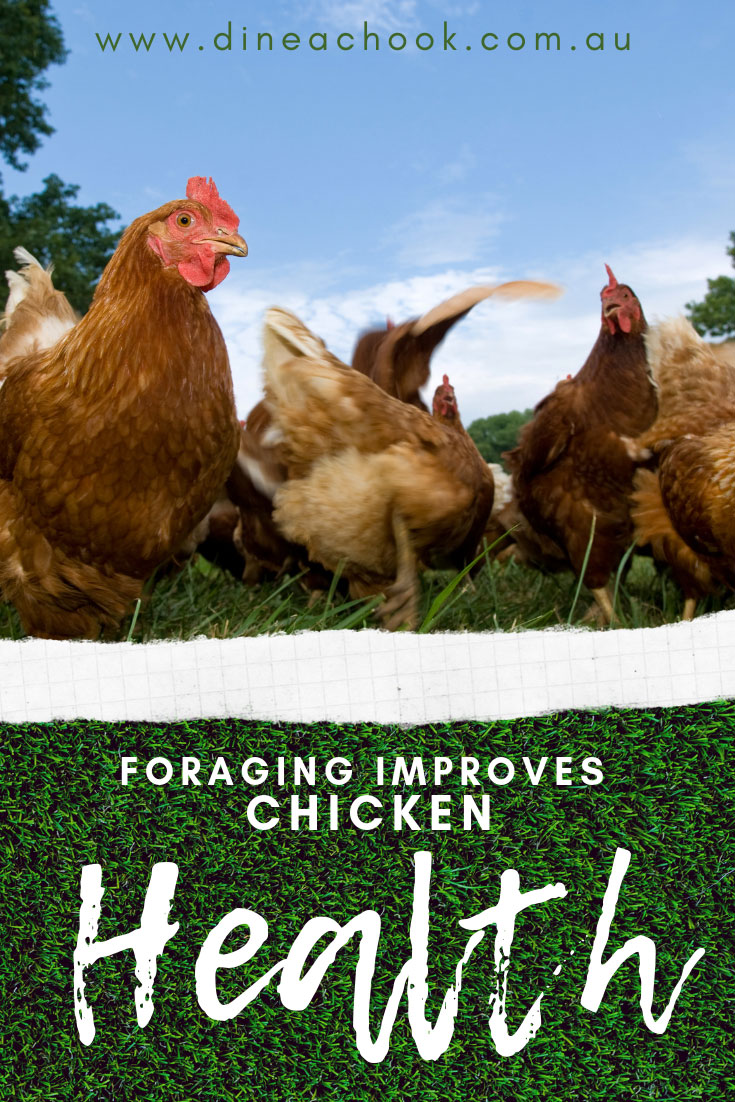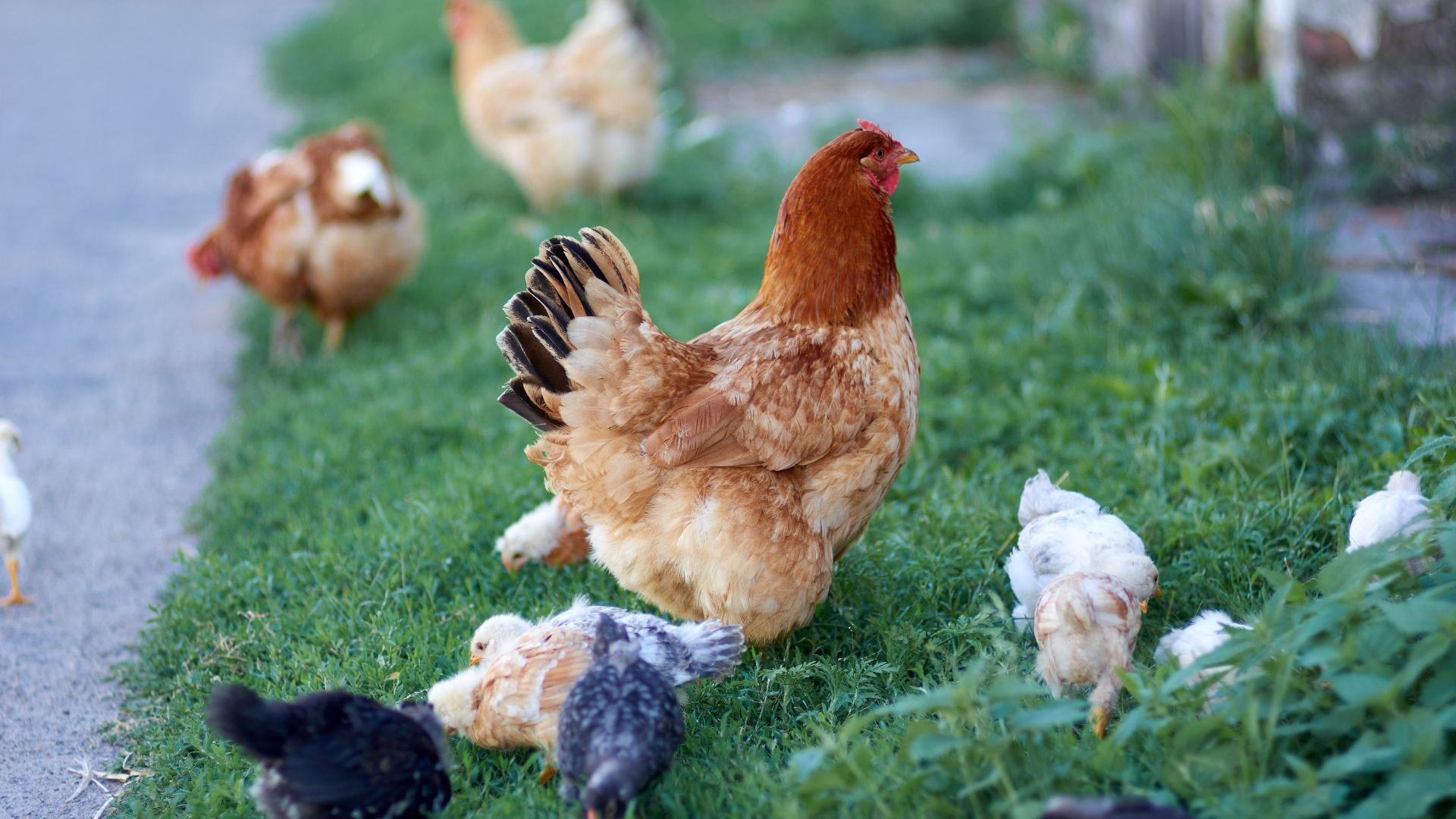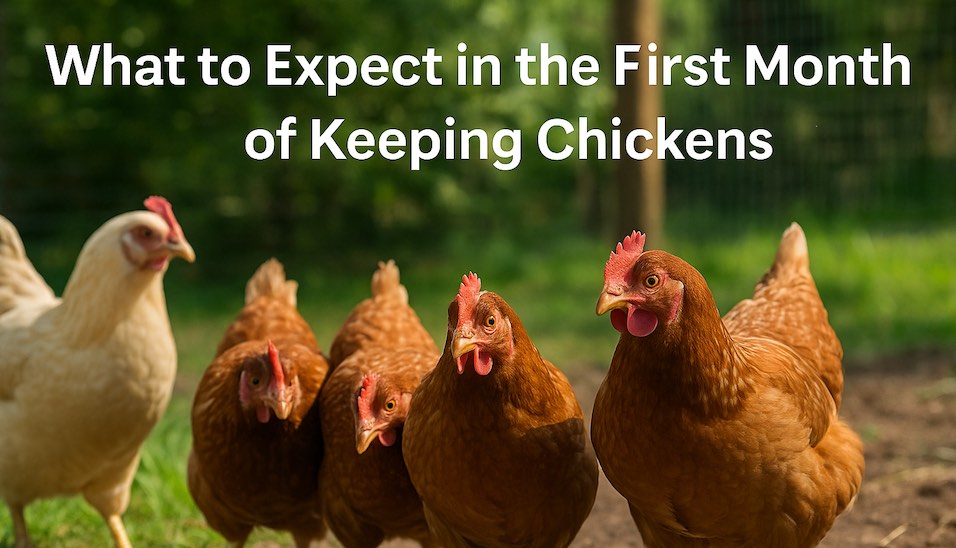Foraging Greens Improves Chicken Behaviour
Foraging Greens Improves Chicken Behaviour
Foraging greens help to form to a complete diet for your backyard chickens. Comprising of mostly weeds and leafy vegetables, these greens provide essential nutrients and amino acids vital for chicken health and productivity.
Aside from helping to provide a balanced diet, foraging greens also help to keep your chicken's behaviour in check, providing a healthy interest to peck at. When a flock of chickens have nothing to keep their interest, and it takes little time for feeding, they can turn on each other, pecking at each other rather than at natural habitat. Studies have shown that forage greens are essential for preventing feather pecking and increasing well-being in chickens.
Free range chickens will happily forage on what is naturally available, but they also appreciate dedicated foraging greens. And if your hens are kept in a coop or run, planting forage greens is a great way to keep them happy without breaking the budget buying lettuces from the supermarket! You can shop Forage Seed Mix here.
Key takeaways
- Foraging is a natural chicken behaviour
- Providing forage to your hens will improve well-being, health and productivity
- Forage plants provide protection from chicken scratching and need time to regrow. Using pots, dedicated garden beds, planting outside the run and protecting plants can make them last longer.
- Chickens can eat a wide range of green plants and a Chicken Forage Mix provides a range of protein and nutrient rich options.
Where to Plant Foraging Greens
Foraging green seed mixes and plants are perfect along the outside of a chicken run, so that the chickens can eat what they can reach through the fence, but not scratch the plants up. Plantings in the coop will need protection to stop your chickens scratching the plants up or over-eating and killing the plants. Use a combination of garden/yard plantings along with planter boxes to provide interest and variety in and around the chicken coop. Sometimes it is easier to plant out a dedicated garden bed with forage plants and either allow your chickens regular access, or pick greens for the coop.
You will require more than one area of greens, to allow the plants to replenish.A combination of plantings will also help to ensure the plants withstand different weather conditions as the seasons change.
Chicken forage mixes in movable pots
Chickens are enthusiastic scratchers. Often they will keep scratching the earth until they reveal and upend roots, killing off plants. For this reason, it is a good idea to numerous areas where your hens can roam, forage and scratch, allowing the previous area to regrow.
Planting foraging seed mixes in movable pots, troughs and even in the odd wheelbarrow helps to ensure there is always somewhere for your hens to forage. Movable pots allow you to move the greens out of the run when the plants need to regrow.
Putting a secure layer of chicken wire over the top of the pot when you plant the seeds will allow chickens to eat the parts of the plants that grow through, while protecting the roots and allowing for regrowth.
How to provide forage if your hens don't free range
Chickens will forage in cut straw and other mulch-like materials. Throwing some Dried Mealworms or seed mix into the mulch will encourage this behaviour, which is healthy for chickens. But in addition to the opportunity to forage, chickens also need green forage plants for optimum health.
If your hens are in a coop, try to provide them with forage greens every day. Here are some ways to provide forage greens in a coop:
- Plant greens in moveable pots and move into the coop to allow grazing.
- Plant forage outside of the coop so chickens can eat what grows through the wire/fence.
- Plant a pot or raised bed in the coop with forage and cover with chicken wire about 30 cm up. This will allow chickens to eat what comes through the wire without destroying the plants.
- Plant a forage bed in the garden and cut greens for your hens. These can be strewn in the coop or tied together and hung up.
- Grow micro greens for your hens.
- Throw any weeds, lawn clippings or garden clippings into the coop. Just be sure you know what the plants are and that they aren't toxic to chickens!
- If you don't have time to grow Chicken Forage, you can buy leafy greens from the supermarket. Cabbages, broccoli and head lettuces work well and hanging them in the coop provides hours of amusement and forage!
If you give your chickens cut greens, ensure you clean up any uneaten forage each day. Uneaten greens can become mouldy and attract rodents to the coop.
Foraging Improves Chicken Behaviour
Chickens are happiest and healthiest if they are physically active every day. Activity is essential for their social health along with their overall physical health.
Foraging is one of the most important activities for chickens. Studies have shown that chickens will forage even when they have access to all the food they need and that foraging has many benefits, including:
- Reduced feather pecking
- Fewer social issues such as bullying
- Increased physical activity
- Less boredom
- Decreased stress levels
- Better nutrition
Free range chickens can produce healthier eggs and forage greens usually make egg yolks a lovely golden yellow. Forage can also help maintain a healthy digestive system.
Providing an area to graze and greens to peck at will encourage your hens to explore beyond their coop, as well as improving their health and well-being. When chickens are free to forage, their stress levels decrease. If they do not have room and something to scratch, peck and claw, chickens peck at each other.
Providing environmental enrichment such as opportunities to forage improves hen behaviour and happiness.
Are greens a complete meal for chickens?
No. Chickens need a complete diet which consists of 16-18% protein and has plenty of calcium, omega 3 fatty acids, and essential vitamins. Greens simply do not provide all of this to ensure optimal chicken health.
Greens boost chicken nutrition by providing vitamins and minerals, but all chickens need unrestricted access to a complete feed as well as foraging greens.
Where can I buy a green foraging seed mix for chickens?
A quality poultry forage mix is available from Dine a Chook. The mix comprises of hardy perennials and self-seeding annuals that chickens and poultry will love. Typical contents include: Barrel medic, bok choy, buckwheat, chicory, clover, cocksfoot, linseed, lucerne, millet, forage plantain, silverbeet, subclover and sunflower. If you provide enough protection from your chickens, the mix will keep producing for months or years!
List of Chicken Forage Plants and Their Benefits
This list is not exhaustive, and not all plants are suitable for all climates. Research your local area or consult your seed supplier to determine what might be suitable for you. Not all plants are perennials, nor will all withstand extensive foraging. Some plants are better suited to being grown outside the chicken coop and harvested by hand.
Amaranth Grain
Amaranth is high in protein and essential amino acids, making it an excellent supplement for chickens. It can also improve egg production.
Asian Greens
Asian greens like bok choy and mustard greens are rich in vitamins A, C, and K, and they provide antioxidants that boost the immune system.
Barrel Medic
Barrel medic is a legume that adds nitrogen to the soil, improving its fertility. It is also high in protein and fiber, supporting overall health and digestion.
Basil
Basil is known for its anti-inflammatory and antibacterial properties, which can help in maintaining the health of chickens.
Beets
Beets are rich in vitamins and minerals like vitamin C, potassium, and manganese. The greens can also be fed to chickens for a nutrient boost.
Borage
Borage leaves are high in calcium, which is essential for strong bones and eggshell formation.
Brassicas
Brassicas, including cabbage and kale, are high in vitamins C and K and provide essential minerals like calcium and magnesium.
Broadbeans
Broadbeans are a good source of protein and fiber. They also contain essential vitamins and minerals that support overall health.
Buckwheat
Buckwheat is rich in rutin, an antioxidant that strengthens blood vessels and improves circulation.
Calendula
Calendula flowers can help improve skin health and have anti-inflammatory properties. They also enhance the color of egg yolks.
Catnip
Catnip has calming effects and can help reduce stress in chickens. It also has mild insect-repellent properties.
Chamomile
Chamomile has soothing properties and can aid in digestion. It also helps in reducing stress and anxiety.
Chia
Chia seeds are high in omega-3 fatty acids, protein, and fiber. They can help improve egg quality and overall health.
Chickweed
Chickweed is rich in vitamins and minerals and helps in improving digestion and overall health.
Chicory
Chicory leaves are high in vitamins and minerals, and they have anti-parasitic properties that can benefit chickens.
Clover
Clover is a good source of protein and contains vitamins and minerals that support overall health.
Cocksfoot
Cocksfoot is a hardy grass that provides a steady source of forage throughout the year.
Comfrey
Comfrey leaves are high in protein and vitamins, supporting growth and egg production.
Coriander
Coriander has antibacterial properties and can help improve digestion.
Dandelion
Dandelion leaves are rich in vitamins A, C, and K, and they help in detoxifying the liver.
Dill
Dill has antibacterial properties and can aid in digestion.
Fennel
Fennel seeds and leaves can help improve digestion and have antioxidant properties.
Forage Chicory
Forage chicory is high in vitamins and minerals, and it has anti-parasitic properties.
Forage Plantain
Forage plantain leaves are rich in vitamins and minerals and have anti-inflammatory properties.
Lavender
Lavender has calming effects and can help reduce stress and anxiety in chickens.
Lemon Balm
Lemon balm has calming properties and can help in reducing stress and anxiety.
Linseed
Linseed (flaxseed) is high in omega-3 fatty acids, which can improve egg quality and overall health.
Lucerne
Lucerne (alfalfa) is high in protein and vitamins, supporting growth and egg production.
Millet
Millet is a good source of energy and provides essential nutrients for overall health.
Mint
Mint has cooling properties and can help in reducing heat stress in chickens.
Moringa
Moringa leaves are highly nutritious, containing essential vitamins and minerals that support overall health.
Mustard
Mustard greens are rich in vitamins A, C, and K, and they provide antioxidants that boost the immune system.
Nasturtium
Nasturtium leaves and flowers have antibacterial properties and can help in improving overall health.
Nettle
Nettle leaves are rich in vitamins and minerals, supporting overall health and egg production.
Oats
Oats are a good source of energy and fiber, supporting digestion and overall health.
Oregano
Oregano has antibacterial properties and can help in improving overall health and digestion.
Parsley
Parsley is rich in vitamins A, C, and K, and it provides antioxidants that boost the immune system.
Peas
Peas are a good source of protein and essential nutrients, supporting growth and egg production.
Pigeon Pea
Pigeon peas are high in protein and provide essential nutrients for overall health.
Purslane
Purslane is rich in omega-3 fatty acids and antioxidants, supporting overall health.
Queensland Arrowroot
Queensland arrowroot is a good source of energy and provides essential nutrients for overall health.
Rocket
Rocket (arugula) is rich in vitamins A and C, and it provides antioxidants that boost the immune system.
Rosemary
Rosemary has antibacterial properties and can help in improving overall health and digestion.
Sage
Sage has antibacterial properties and can aid in digestion and overall health.
Saltbush
Saltbush is a hardy plant that provides essential nutrients and supports overall health.
Silverbeet
Silverbeet (chard) is rich in vitamins A, C, and K, and it provides essential minerals for overall health.
Sunflower
Sunflower seeds are high in protein and healthy fats, supporting growth and egg production.
Tagaste
Tagaste is a legume that adds nitrogen to the soil and provides essential nutrients for overall health.
Thistle
Thistle leaves are high in vitamins and minerals, supporting overall health.
Thyme
Thyme has antibacterial properties and can aid in digestion and overall health.
Vetch
Vetch is a legume that adds nitrogen to the soil and provides essential nutrients for overall health.
Do you have other favourite chicken forage plants? Let us know!
Don't forget to pin it:






